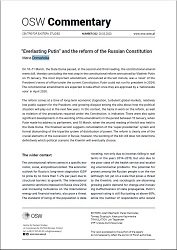“Everlasting Putin” and the reform of the Russian Constitution
“Everlasting Putin” and the reform of the Russian Constitution
Author(s): Maria Domańska
Subject(s): Constitutional Law, Governance, Electoral systems
Published by: OSW Ośrodek Studiów Wschodnich im. Marka Karpia
Keywords: Russian Constitution; Putin's constitution; State Duma; Putin's term of office;
Summary/Abstract: On 10–11 March, the State Duma passed, in the second and third reading, the constitutional amendments bill, thereby concluding the next step in the constitutional reform announced by Vladimir Putin on 15 January. The most important amendment, announced at the last minute, was a ‘reset’ of the President’s terms of office (under the current Constitution, Putin could not run for president in 2024). The constitutional amendments are expected to take effect once they are approved by a ‘nationwide vote’ in April 2020. || The reform comes at a time of long-term economic stagnation, turbulent global markets, relatively low public support for the President, and growing disquiet among the elite about how the political situation will play out in the next few years. In this context, the haste in work on the reform, as well as violation of the procedures required under the Constitution, is indicative. There were also quite significant developments in the wording of the amendments in the period between 15 January, when Putin made his address to parliament, and 10 March, when the second reading of the bill was held in the State Duma. The finalised version suggests consolidation of the ‘super-presidential’ system and formal dismantling of the tripartite system of distribution of power. The reform is clearly one of the crucial elements of the succession in Russia; however, the wording of the bill still does not determine definitively which political scenario the Kremlin will eventually choose.
Series: OSW Commentary
- Page Count: 9
- Publication Year: 2020
- Language: English
- Content File-PDF

